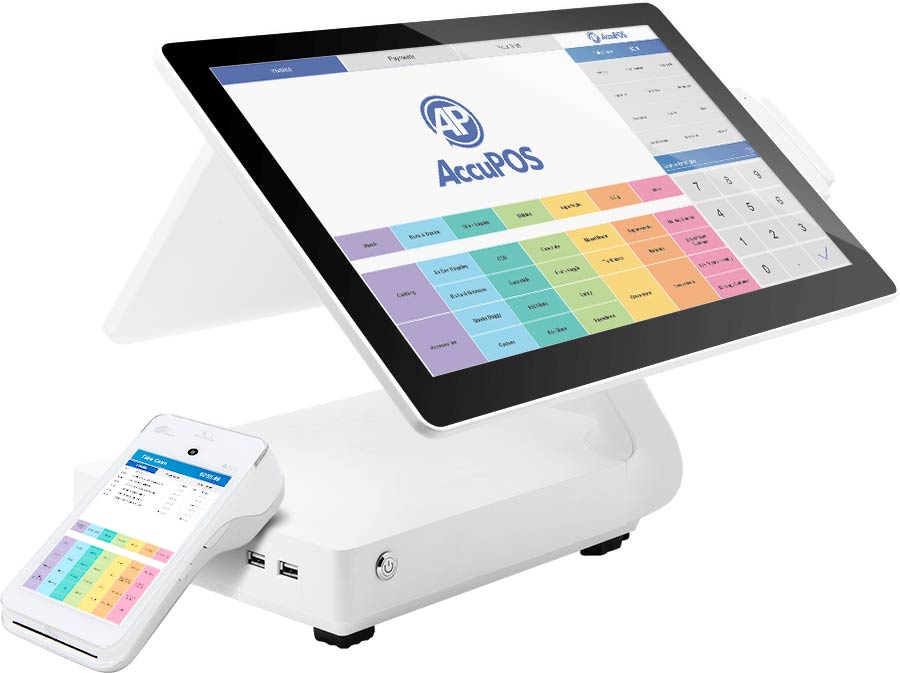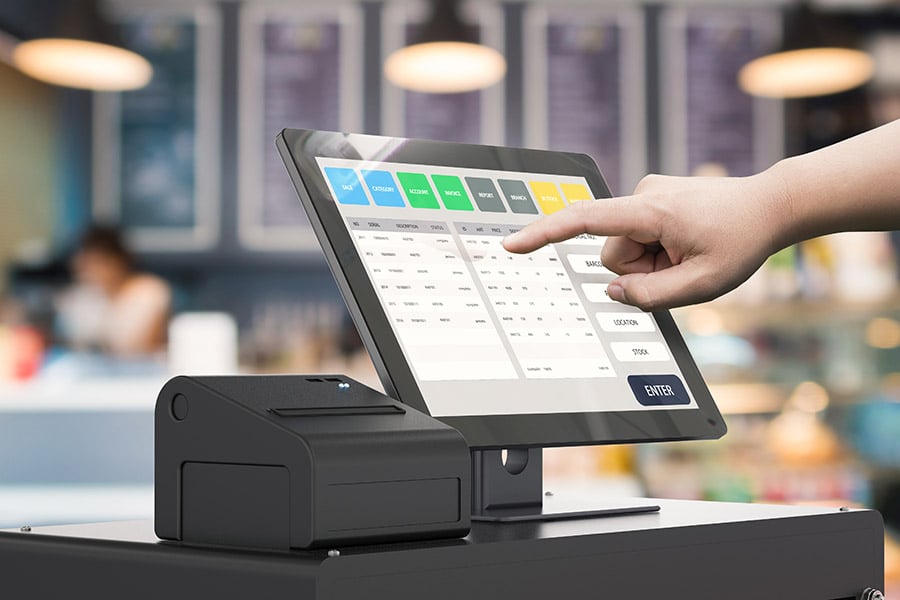What Does Point Of Sale Software Do?
What Does Point Of Sale Software Do?
Blog Article
All About Pos

Pos System for Small Business: Retail Point-Of-Sale Solutions Streamline Deals
Excitement About Pos

Hardware Elements of a Point of Sale System What makes a POS system tick? It's not simply software application; the hardware plays a starring function. Consider it as the body to the software's brain. Without the ideal hardware, even the most advanced POS software application is simply a quite face. Vital POS Hardware So, what are the must-haves? Let's break it down. The main processing unit, frequently a computer system or tablet, is the heart of the operation. The display or touchscreen show allows personnel to communicate with the system. A barcode scanner speeds up the checkout procedure. Remember the days of manually going into each code? The trusty receipt printer supplies consumers with a record of their purchase. A money drawer keeps your cash safe and organized. A card reader permits consumers to pay with credit or debit cards. Diving Deeper: Beyond the Fundamentals But wait, there's more! Depending upon your business, you might need specialized hardware. For example, a dining establishment may integrate kitchen area printers to relay orders, while a retailer might use label printers for product tagging. Ever wonder how your regional bakeshop quickly prints those delicious-looking labels? Choosing the Right Hardware: A Balancing Act Selecting the right hardware isn't almost buying the most costly devices. It's about discovering the sweet spot in between performance, durability, and spending plan. A little service just starting might choose for a more standard setup, while a high-volume merchant will require robust, high-performance devices. Is it much better to purchase brand-new or used? Consider your choices thoroughly. A brand-new system provides the most current innovation and guarantee defense, but a reconditioned system can save you money. The Future of POS Hardware What does the future hold? Expect to see much more integration with mobile gadgets, biometric scanners for worker authentication, and advanced analytics control panels showed on bigger, clearer screens. Picture a world where inventory is automatically updated in real-time as products are scanned-- a world where you can track your best-selling product from throughout the world. The possibilities are unlimited, and the hardware is continuously progressing to check here satisfy the demands of today's services. Are you all set to update your point of sale system?
Software Application Characteristics and Capabilities: The Heart of Your POS System
Ever watch an experienced barista glide through a hectic early morning rush? Their secret isn't simply caffeine; it's a seamless dance with their POS system. The software is the conductor of your business symphony, orchestrating whatever from sales to stock. However what notes should you be listening for? What abilities really matter in today's market?
Inventory Management: Beyond Counting Beans
Forget spreadsheets that haunt your dreams. Modern POS systems use real-time stock tracking, alerting you when your stock of artisanal coffee beans dips precariously low. Consider it as a digital guardian angel, avoiding those awkward "Sorry, we're out!" minutes to clients. What if you could also forecast demand based upon historical information? Many systems now use forecasting tools, an effective weapon versus overstocking and lost sales. This assists avoid the situation of lacking popular products or building up excess inventory of slow-moving products, both of which can constrain money circulation and space.
Sales Reporting and Analytics: Deciphering the Information
Sales data is the brand-new gold, and your POS system is the miner. Forget simply knowing how much you offered today. Dive deep into the information to uncover patterns, recognize your very popular products, and comprehend consumer behavior. Which menu item pairs perfectly with the daily special? Which promo resonated most with your customers? These insights are not simply interesting; they're actionable intelligence. Without dependable sales reporting, navigating the complexities of business decision-making becomes like cruising without a compass, increasing the chance of errors and missed opportunities.
Client Relationship Management (CRM): Structure Bridges, Not Walls
Remembering a routine customer's name and favorite order is lovely, but scaling that personal touch is challenging. POS systems with CRM capabilities enable you to track client purchase history, preferences, and even birthdays. Picture automatically providing a discount rate on their birthday-- a small gesture that cultivates commitment and encourages repeat business. There is the possible snag of bad information quality, which can lead to unreliable customer profiles and inadequate marketing efforts.
Payment Processing: Enhancing the Deal
The checkout experience can make or break a sale. Smooth integration with numerous payment techniques-- charge card, mobile wallets, even copyright-- is non-negotiable. Can your system manage split payments? Does it use safe and secure tokenization to protect consumer data? A cumbersome payment process is like striking a sour note in your company symphony, possibly interfering with the entire performance. Guaranteeing compatibility with developing payment innovations and adherence to security requirements are paramount for preserving client trust and operational efficiency.
Staff Member Management: Keeping the Team in Sync
From clocking in and out to managing permissions and tracking performance, staff member management features improve operations and enhance responsibility. Is scheduling a nightmare? Numerous POS systems use incorporated scheduling tools, enhancing staffing levels based on anticipated need. A common challenge that is typically neglected is the difficulty of integrating employee management functionalities with payroll systems, which can result in mistakes and inadequacies in wage calculations.
Advanced Features: Leveling Up Your Operations
- Table Management: Perfect for dining establishments, this function enables you to imagine your dining-room, track table status, and manage reservations.
- Loyalty Programs: Reward your best clients and encourage repeat company with integrated loyalty programs.
- Online Purchasing Combination: Effortlessly integrate your POS system with online purchasing platforms to broaden your reach.
Picking the right POS system is about more than simply performance; it's about finding a partner that can grow with your business. Consider your existing requirements, anticipate future growth, and do not be scared to ask the difficult concerns. The ideal software application can transform your company from a chaotic cacophony into a harmonious masterpiece.
Industry-Specific POS System Applications
Think of the regional bakery, bustling with morning clients craving fresh croissants. A generic POS system might manage transactions, however can it manage complicated recipes, track component stock, or instantly change production schedules based upon sales information? Probably not. That is where the appeal of industry-specific POS systems shines.
Restaurants and Hospitality
For dynamic restaurants, speed and accuracy are vital. The number of times have you seen servers managing orders, adjustments, and splitting expenses, all while trying to offer excellent service? A restaurant POS system enhances these processes, permitting for table management, kitchen order tickets, and even online purchasing combination. These systems frequently consist of features like ingredient-level stock tracking, important for managing food costs and lessening waste. Ever wonder why your preferred meal is often unavailable? It may stem from a lack of proper inventory management.
- Table Management
- Kitchen Order Tickets
- Online Buying Integration
- Ingredient-Level Inventory Tracking
Retail Solutions
Retail, with its varied stock and client interactions, requires a various set of tools. Imagine a store clothing store struggling to keep an eye on sizes, colors, and seasonal collections using a basic checkout system. An industry-specific retail POS system provides functions like barcode scanning, consumer commitment programs, and detailed sales reporting. These systems can even integrate with e-commerce platforms, offering a smooth omnichannel experience for clients. Did you understand some retail POS systems can forecast future sales trends based upon historical information? Now that is powerful!
The Perils of an Inequality
Picking the incorrect POS system can create considerable operational hurdles. A clothes boutique using a dining establishment POS, for instance, would discover it unsuitable for managing stock with sizes and colors. The absence of appropriate reporting and analytics could cause misinformed acquiring choices and lost income. The result could be similar to trying to fit a square peg in a round hole.
Secret Considerations
Choosing an industry-specific POS system requires mindful evaluation. Believe about your company's unique requirements and operational workflows. Does the system integrate with existing software application? Does it provide the necessary reporting capabilities? Is it scalable to accommodate future growth? A well-chosen POS system is not just a deal tool; it's a strategic property that can drive efficiency, improve customer complete satisfaction, and ultimately, boost your bottom line. Keep in mind, it is an investment in your service's future, not just a cost.
Security Factors To Consider for Point of Sale Systems
Ever heard the tale of the mom-and-pop store that lost everything because of a single, overlooked security flaw in their POS system!.?. !? It's a cautionary tale, and it highlights a vital aspect often overshadowed by the allure of expensive features and streamlined operations. The reality is, a POS system is just as excellent as its security. What excellent is a system that crunches numbers in a flash if it allows lawbreakers to swipe consumer's data simply as quickly?
The Vulnerability Minefield
The digital landscape is a battleground. Every POS system, no matter size or sophistication, is a prospective target. Are you genuinely got ready for the risks prowling around the corner? The real pinch comes when you find that your out-of-date software application has a gaping hole that hackers can make use of, turning your organization into an unwitting accomplice in identity theft. The problem is that hackers are crafty and are constantly altering their strategies.
Typical Security Gaps and Expert Tips
- Weak Passwords: "Password123" isn't sufficing. Usage strong, distinct passwords for all POS system accounts and alter them regularly. Two-factor authentication is a must.
- Unsecured Networks: Your Wi-Fi resembles leaving the front door open. Protect your network with strong encryption (WPA3 if possible) and consider a separate network for your POS system.
- Outdated Software: Software vendors spot security holes all the time. Stopping working to upgrade is like inviting difficulty. Establish automatic updates or schedule routine upkeep.
- Worker Training: Your personnel is your very first line of defense. Train them to recognize phishing attempts, safeguard passwords, and report suspicious activity.
Data Encryption: Your Shield Against the Dark Arts
Believe of data encryption as a secret code. It scrambles delicate information, like credit card numbers, making it unreadable to unauthorized users. Without encryption, your clients' monetary information resemble sitting ducks, ripe for the picking by cybercriminals. It's not almost securing your customers; it's about securing your track record and avoiding large fines.
PCI Compliance: The Rulebook You Can't Disregard
If you accept credit cards, you're bound by the Payment Card Market Data Security Standard (PCI DSS) It's a set of security standards designed to protect cardholder information. Failing to comply can lead to fines, penalties, and even the loss of your ability to process charge card payments. It's a headache, yes, however it's a needed one. Consider PCI compliance as the expense of doing service in the digital age.
Consider this: every transaction processed through your point of sale is a prospective entry point for harmful actors. By carrying out robust security procedures, you're not just protecting your business; you're protecting your consumers' trust and ensuring the long-term viability of your operations. The security of your POS system isn't simply a technical concern; it's a company important. It needs consistent caution, proactive measures, and a dedication to staying ahead of the curve.